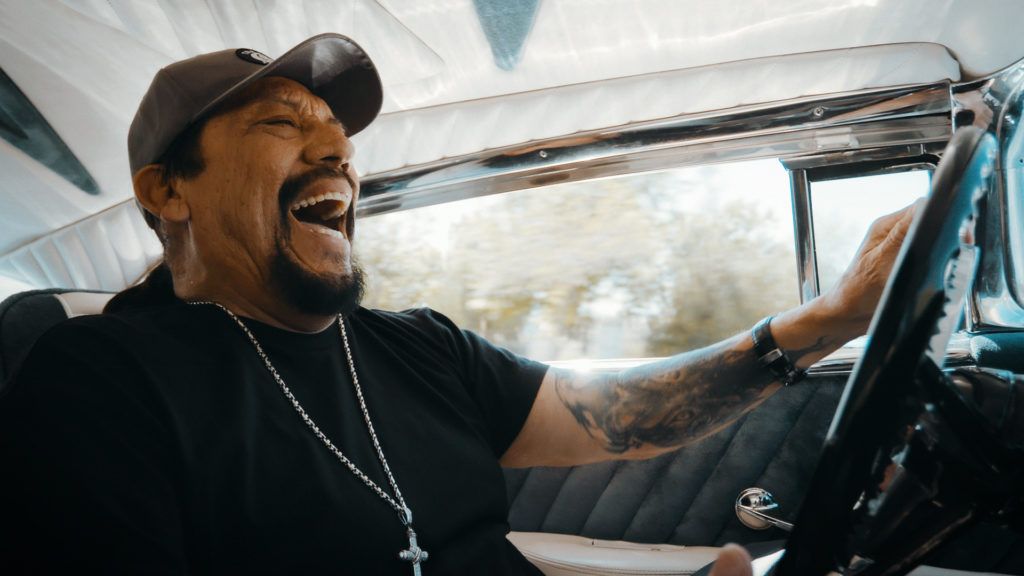Inmate #1: The Rise of Danny Trejo

Danny Trejo in his '56 Bel Air in Universal Pictures' INMATE #1: THE RISE OF DANNY TREJO.
A salve for constant anger, Gilbert Trejo’s lifelong heroin addiction attracted his nephew Danny into a downward spiral of drugs, alcohol, and eventually crime. By the time he was 25, Danny tumbled in and out of juvenile correctional facilities and six prisons, for burglaries, robberies, and car thefts along Lankershim Boulevard, southeast of his neighborhood in Pacoima.
From his prison stints on through his acting career, the veteran actor recounts formative experiences in his storied life, as he shows us around his old neighborhood from behind the wheel of his ’56 Chevy Bel Air. We learn about Trejo’s serendipitous journey through a series of interviews with his son, daughter, friends and acquaintances—including actors Donal Logue and Michelle Rodriguez, as well as his bodyguard, Craig Balkam, and AA/NA sponsor, Jhonnie Harris.
Disappointed by his father’s abusiveness and uncle’s drug dependency, Trejo took inspiration from actor Pedro Gonzales Gonzales—John Wayne’s sidekick and real life grandfather of Clifton Collins, Jr. In solitary confinement for the suspected assault on a prison guard, Trejo’s mind escaped to THE WIZARD OF OZ. While inside, he trained and held the prison’s welterweight boxing champion title for four years. A chance encounter with Eddie Bunker at Folsom Prison eventually materializes into to a job as Eric Roberts’ boxing coach in RUNAWAY TRAIN.
“If we don’t take this to pass it on to somebody else, what good is it?” -Jhonnie Harris
Seizing upon the advice of his AA mentor, upon his release from San Quentin in 1969, Trejo sets about doing charity for others, mentoring community youth programs and fostering coping skills for recovering addicts in the prison system. With this purpose and focus, he’s kept sober for 51 years.
Now 76, the father of two, with a staggering 355 roles under his belt, including the lead as Robert Rodgriguez’ titular “Mexploitation” hero in MACHETE, Trejo recounts most of his life experiences with humor, not regret.
Directed by Brett Harvey, the film paints a familiar portrait—the wayward youth, now reformed and successful. Aside from the familiar beats made enjoyable through Trejo’s genuinely likable personality, the film falters slightly by taking his accounts solely at face value. No shortage exists of documentary subjects who heap praise upon AA, without examining their dubious success metrics—low recorded relapse rates due to omission of participant attrition. Likewise, while Trejo connects his menacing appearance to his early propensity toward crime, there’s a conspicuous absence of any discussion around systemic disparities in economics and the criminal justice system.
Having grown up in a predominantly Hispanic neighborhood, it’s unlikely for Trejo to attribute the trajectory of his life through that larger lens. While Hispanics account for 16.7% of the U.S. population, they make up 24% of the prison population. It’s a missed opportunity as both the relevance and impressiveness of Trejo’s achievements stand taller when understood in the context of these adverse circumstances.
Yet Trejo remains keenly aware that the alternative—staying addicted—rarely ends any other way than madness or death. Apropos, he keeps himself occupied. IMDb lists him as acting in 28 movies currently in pre-production, production, or post-production. Grateful that he’s among the busiest men in Hollywood, he shouts back to a fan admiring his car, “Machete cruises!”